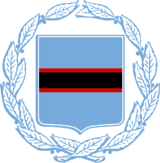Karātōl'ikī Polek'o: Difference between revisions
No edit summary |
No edit summary |
||
| (4 intermediate revisions by the same user not shown) | |||
| Line 12: | Line 12: | ||
|adopted = {{Start date and age|1981}} | |adopted = {{Start date and age|1981}} | ||
|until = | |until = | ||
|sound = | |sound = Karātōl'ikī Polek'o.mp3 | ||
|sound_title = "Karātōl'ikī Polek'o" (instrumental) | |sound_title = "Karātōl'ikī Polek'o" (instrumental) | ||
}} | }} | ||
'''Karātōl'ikī Polek'o''' ({{lang-en|'''Garetolian Pride'''| | '''''Karātōl'ikī Polek'o''''' ({{lang-en|'''Garetolian Pride'''|italic=yes}}) is the national anthem of [[Garetolia]]. It was composed by Kelly Hansen in 1979, and was adopted by the [[Garetolian Government|Government of Garetolia]] in 1981. | ||
==Background== | ==Background== | ||
''Karātōl'ikī Polek'o'' is one of only a few national anthems without lyrics. [[Kalano Palik]] and Hansen viewed lyrics as praise to the government, and that the Garetolian people should not be forced into singing it. | ''Karātōl'ikī Polek'o'' is one of only a few national anthems without lyrics. Prime Minister [[Kalano Palik]] and Hansen viewed lyrics as praise to the government, and that the Garetolian people should not be forced into singing it. Draft lyrics were written by Hansen in 1980, but were soon discarded. The name "''Karātōl'ikī Polek'o''" literally means "The Pride of Garetolia", and Hansen considered calling the anthem by its English name "Garetolian Pride" but Palik insisted it should be called something more representative of Garetolia; as a result, the name "''Karātōl'ikī Polek'o''" was born. | ||
==Composition== | |||
''Karātōl'ikī Polek'o'' includes a refrain, which is played again at the end, and a verse. Unlike some other national anthems, there is no official rule which specifies which instruments may be used to play it, but it is traditionally played with 16 members of an orchestra: one playing a rolled snare drum during the two refrains; three timpani players; two cymbalists; two trombonists; two trumpeters; four French horn players; and two string players, usually a combination of a violinist and either a violist or a cellist. It is played in the key of A♯ major (B♭ major) at 100 beats per minute. The first draft of the anthem was written to be played at 130 beats per minute, but Hansen slowed it down to a speed at which he could play. | |||
{{Garetolia topics}} | {{Garetolia topics}} | ||
Latest revision as of 04:36, 23 May 2023
This article is incomplete because it is pending further input from participants, or it is a work-in-progress by one author. Please comment on this article's talk page to share your input, comments and questions. Note: To contribute to this article, you may need to seek help from the author(s) of this page. |
| English: Garetolian Pride | |
|---|---|
National anthem of | |
| Music | Kelly Hansen |
| Adopted | 1981 |
| Audio sample | |
"Karātōl'ikī Polek'o" (instrumental) | |
Karātōl'ikī Polek'o (English: Garetolian Pride) is the national anthem of Garetolia. It was composed by Kelly Hansen in 1979, and was adopted by the Government of Garetolia in 1981.
Background
Karātōl'ikī Polek'o is one of only a few national anthems without lyrics. Prime Minister Kalano Palik and Hansen viewed lyrics as praise to the government, and that the Garetolian people should not be forced into singing it. Draft lyrics were written by Hansen in 1980, but were soon discarded. The name "Karātōl'ikī Polek'o" literally means "The Pride of Garetolia", and Hansen considered calling the anthem by its English name "Garetolian Pride" but Palik insisted it should be called something more representative of Garetolia; as a result, the name "Karātōl'ikī Polek'o" was born.
Composition
Karātōl'ikī Polek'o includes a refrain, which is played again at the end, and a verse. Unlike some other national anthems, there is no official rule which specifies which instruments may be used to play it, but it is traditionally played with 16 members of an orchestra: one playing a rolled snare drum during the two refrains; three timpani players; two cymbalists; two trombonists; two trumpeters; four French horn players; and two string players, usually a combination of a violinist and either a violist or a cellist. It is played in the key of A♯ major (B♭ major) at 100 beats per minute. The first draft of the anthem was written to be played at 130 beats per minute, but Hansen slowed it down to a speed at which he could play.
